外研版四年级英语下册课件MODULE3 unit1
外研社(三起)小学英语四年级下册Module 1 Unit 1—课件

This is Ms Smart. 这是斯玛特女士。
Ms常常用在女士的姓氏前面,译为“××女士”, 多在不知道对方已婚还是未婚时使用。所以无论对方 时已婚还是未婚女士都可以用Ms相称。
如:Ms White怀特女士 (1)Miss意为“小姐”用于对未婚女子的称呼。 (2)Mrs 译为“夫人,太太”,常用于已婚妇女的 丈夫姓氏前。 (3)Mr 译为“先生”,一般用于男士姓氏或职务前, 不管年龄大小。
A: This is Parrot. B: It’s very naughty! But it’s not a bad bird.
You made my day!
数阅 学使 读使 人人 精充 细;博物使 实会谈;使 人人 深敏 沉捷 伦;理 写;作 使与 人笔 逻庄重; 记使人精 辑确 与修 ;史 辞辩使人善。 鉴诗使人明智;歌
使 人 巧 慧 ;
我们,还在路上……
Listen to the dialogue
Read the dialogue
Look, the elephant is clever. 看,这个大象很聪明。
And very naughty too. 并且也非常淘气。
Watch the video and read again
2 Listen, point and find “She’s/He’s …”
Can you answer the call now? 你现在能够接电 话吗?
And this is Parrot. 这是帕罗特。
Parrot is very naughty! But he’s not a bad bird. 帕罗特非常淘气!但它不是
四年级下册英语说课稿-Module3 Unit1|外研社(三起)

四年级下册英语说课稿-Module3 Unit1|外研社(三起)一、教学目标1.掌握本单元的新单词:garden, apples, pears, oranges, peaches, bananas, strawberries, fruits。
2.能够听懂、会说并正确运用句型:What are these? They are fruits.。
3.培养学生爱好口语表达能力,通过掌握基础单词启发他们的思维能力。
二、教学重难点1.教学重点:学生能够听懂、会说并正确运用句型:“What are these? They are fruits.”。
2.教学难点:学生能够掌握本单元的新单词,并能够流利地说出它们。
三、教学准备1.课件、图片、录音资料2.水果图片版卡片、水果玩具模型四、教学过程1. 热身活动(时间:5分钟)观看一段关于水果的视频资料,让学生对水果产生浓厚的兴趣。
2. 导入新知识(时间:5分钟)出示一个盘子,问学生:“What are these fruits?”引导学生回答:“They are fruits。
”接着,老师拿出不同种类的水果,例如苹果、梨子、橙子、桃子等,向学生展示并读出水果的名称。
通过这一环节,让学生初步认识本单元的新单词。
3. 学习新词汇(时间:10分钟)引导学生跟读本单元新单词。
并使用图片让学生记忆单词。
4. 活动互动(时间:25分钟) 1. Where are the fruits? 老师表演一个场景,学生分组模拟,一个人当“老师”,其他学生分别拿着“水果”模型走到“老师”后,回答“What are these?”。
“老师”则正确地回答“ They are fruits.” 2.Fruit Memory Game 学生自由分组,每一组有两个玩家,通过翻盘子中水果卡片,组成水果的名称,记住位置,时间到交换卡片让对方拼写并判断对方答案是否正确。
3. Fruit Race 将课室分成四个小组,每个小组选一个学生,分别挑选一个水果模型并在课室中跑步,说出相应水果的名称,然后把模型递给下一个小组的学生,然后下一个小组的学生拿鸣笛在起点处,完成比赛后,小组进行点赞选出胜利小组。
外研版 四年级下册Module 3 Unit 1Robots will do everything
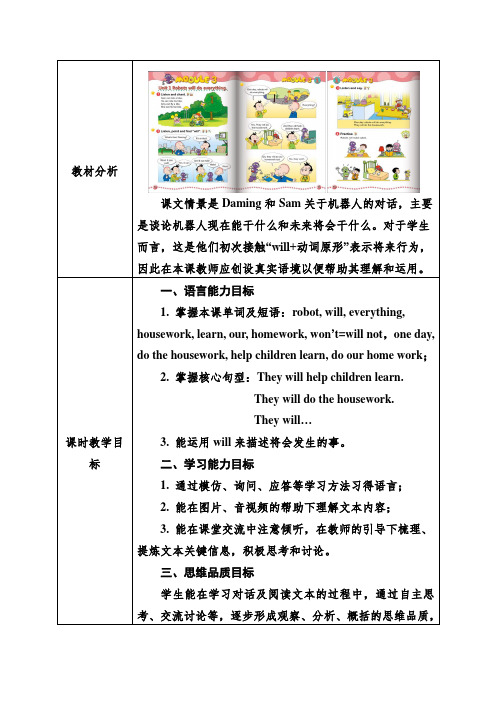
教材分析课文情景是Daming和Sam关于机器人的对话,主要是谈论机器人现在能干什么和未来将会干什么。
对于学生而言,这是他们初次接触“will+动词原形”表示将来行为,因此在本课教师应创设真实语境以便帮助其理解和运用。
课时教学目标一、语言能力目标1. 掌握本课单词及短语:robot, will, everything, housework, learn, our, homework, won’t=will not,one day, do the housework, help children learn, do our home work;2. 掌握核心句型:They will help children learn.They will do the housework.They will…3. 能运用will来描述将会发生的事。
二、学习能力目标1. 通过模仿、询问、应答等学习方法习得语言;2. 能在图片、音视频的帮助下理解文本内容;3. 能在课堂交流中注意倾听,在教师的引导下梳理、提炼文本关键信息,积极思考和讨论。
三、思维品质目标学生能在学习对话及阅读文本的过程中,通过自主思考、交流讨论等,逐步形成观察、分析、概括的思维品质,help children learn. What can you do?Ss: I can...2. 出示课题:Module 3 Unit 1 Robots will do everything . 垫。
(about 3 minutes)Step 2: Lead in 1. Look and say观察图片,通过教师的问题引领What can Sam / Amy do? 引出chant的内容。
2. Watch and chant看动画,学唱歌谣。
3. 听音看图说一说。
T: Who is coming?Ss: It’s a robot.(自然拼读新授单词:robot)T: It’s Daming’s robot.It can do a lot.Chant导入,通过朗朗上口的歌谣培养学生的语感;然后对活动一图片进行了整合,让机器人走进画面,自然过渡到主课文,从而引出本课课题。
外研版小学英语(三起)四年级下册Module3Unit1教材内容全解

外研版小学英语四年级下册Module3Unit1教材内容全解Module3Unit1教材内容全解Module3Unit1 Robots will do everything.机器人将会做所有事情。
1.Listen and chant.听一听并说唱。
【课文全译】Sam can ride a bike. 萨姆会(能)骑自行车。
He can ride his bike. 他会(能)骑他的自行车。
Amy can fly a kite. 埃米会(能)放风筝。
She can fly her kite. 她会放(能)她的风筝。
【课文注解】can(情态动词)能,会,用于一切人称(第一、二、三人称都用can,没有第三人称单数形式),且can后必须跟动词原形,含有can的句子变为否定句在can后加not(缩略形式can’t),一般疑问句把can提到句前放句首(在主语之前),肯、否回答用can 来回答。
如:I can play football.我会踢足球。
She can point to the window.她能指着窗子。
They can not(can’t)play basketball.他们不会打篮球。
Can you ride a bike? Yes,I can./No,I can’t. 你会骑自行车吗?是的,我会。
/不,我不会。
对What can+主语+do?例如:(对画线部分提问)What can Sam do? 【拓展记忆】Can的用法:1. (表示能力、功能)能,会。
The classroom can seat thirty students.这教室能坐三十位学生。
June can drive now. 琼现在会开车了。
2. (表示可能性)可能,可能会。
I think the work can be completed ahead of time. 我认为这项工作能提前完成。
3. (表示允许、请求)可以。
小学四年级英语【外研版】上册教学课件-【Module 3 Unit 1】
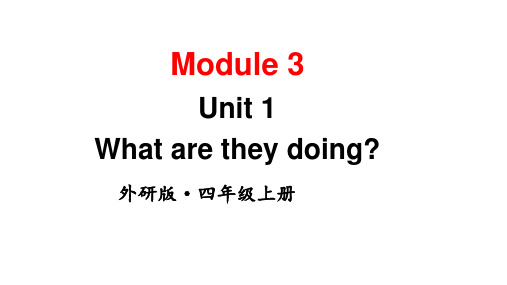
有趣的
Riding a bike is interesting.
They are people, not things.
相对词
people
东西,物品,事情
What activities(活动) can you see?
打太极拳
doing taijiquan
playing
chess
下国际 象棋
国际象棋
They’re playing football.
Let’s watch the video together.
Role-play with your partner.
What are the kids doing?
They’re listening to music.
What are they doing?
饥饿的
Look a(t) the clock. It’s
twelve now. I’m hungry.
Me too. Let’s go. 我也一样。
Look and answer.
Who are they? They are Amy and Daming. Where are they? They are on the bus.
What are they doing? They’re doing taijiquan.
What are they doing? They’re rowing a dragon boat.
What are they doing? They’re playing chess.
What are they doing? They’re drinking soya milk.
What are they doing? They’re doing taijiquan.
外研版(三起)(2012)小学英语四年级下册Module3Unit1Robotswilldoeverything.习题
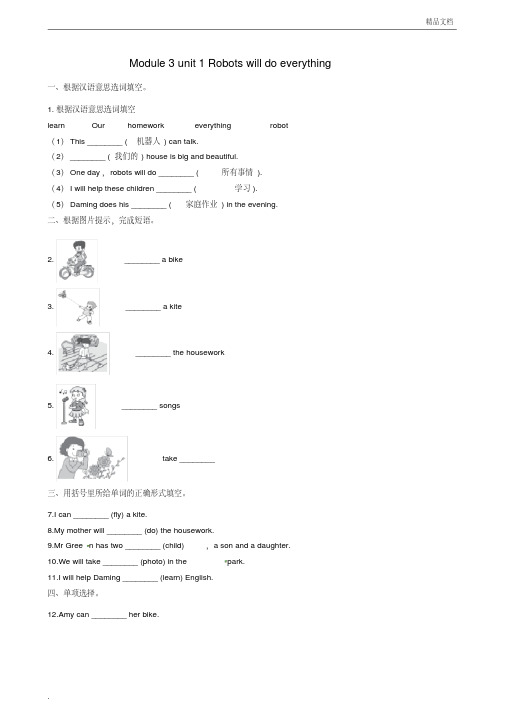
精品文档Module 3 unit 1 Robots will do everything一、根据汉语意思选词填空。
1.根据汉语意思选词填空learn Our homework everything robot(1)This ________ (机器人) can talk.(2)________ (我们的) house is big and beautiful.(3)One day,robots will do ________ (所有事情).(4)I will help these children ________ (学习).(5)Daming does his ________ (家庭作业) in the evening.二、根据图片提示,完成短语。
2.________ a bike3.________ a kite4.________ the housework5.________ songs6.take ________三、用括号里所给单词的正确形式填空。
7.I can ________ (fly) a kite.8.My mother will ________ (do) the housework.9.Mr Gree n has two ________ (child),a son and a daughter.10.We will take ________ (photo) in the park.11.I will help Daming ________ (learn) English.四、单项选择。
12.Amy can ________ her bike.精品文档A. rideB.rides C.riding13.—What's that?—________ a kite.A. That'sB. It'sC.This's14.Robots will ________ everything.A. doB. doesC. did15.They will help the boy ________.A. learningB.learnt C. lea rn16.—Will they do our homework?—No, ________.A. they willB. theywon't C. they can't五、为下列图片选择合适的句子。
外研版四年级下册英语《Unit 1 Robots will do everything.》教案

外研版四年级下册英语Module 3《Unit 1 Robots will do everything.》教案教材分析:本节课是外研版四年级下册Module 3的第一单元,题目为《Unit 1 Robots will do everything.》。
教材主要围绕机器人在未来可能承担的各种任务展开,引导学生运用将来时表达对未来的想象和预测。
教材内容简洁明了,适合四年级学生的语言水平和认知能力。
教学目标:语言知识:1. 学生能理解并运用以下单词:robot, will, everything, our, one day, housework, won't = will not, learn, homework。
2. 学生能理解并运用句型:One day, robots will do everything. They'll do the housework.语言技能:1. 学生能听懂并说出句子:One day, robots will do everything. They'll do the housework.2. 学生能用will来谈论将来可能发生的事情。
情感态度:1. 学生对未来科技发展的可能性和机器人在生活中的作用保持积极态度。
2. 学生的想象力和创造力得到提高。
教学重点:1. 理解并运用句型:One day, robots will do everything. They'll do the housework.2. 能听懂、认读robot, will, everything, our, one day, housework, won't = will not, learn, homework等单词。
教学难点:1. 学生能运用will谈论将来可能发生的事情。
2. 引导学生尝试复述课文。
学情分析:四年级学生已经掌握了一定的英语基础知识,能够理解简单的英语句子和表达自己的意思。
新标准英语(三年级起点)第四册Module 3 Unit 1教案
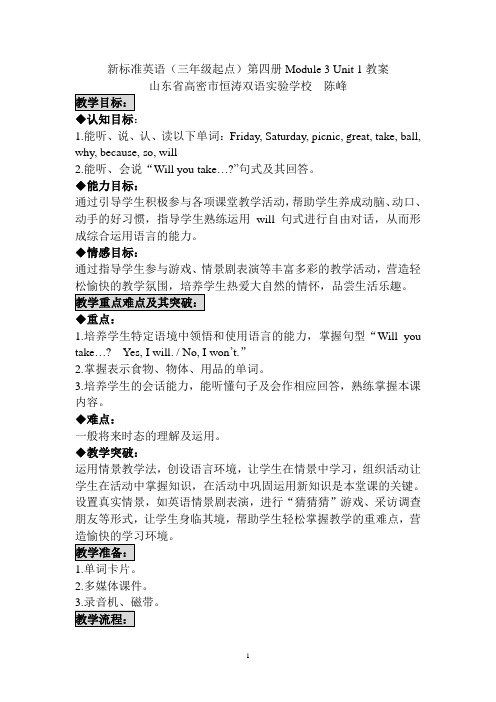
新标准英语(三年级起点)第四册Module 3 Unit 1教案山东省高密市恒涛双语实验学校陈峰◆认知目标:1.能听、说、认、读以下单词:Friday, Saturday, picnic, great, take, ball, why, because, so, will2.能听、会说“Will you take…?”句式及其回答。
◆能力目标:通过引导学生积极参与各项课堂教学活动,帮助学生养成动脑、动口、动手的好习惯,指导学生熟练运用will 句式进行自由对话,从而形成综合运用语言的能力。
◆情感目标:通过指导学生参与游戏、情景剧表演等丰富多彩的教学活动,营造轻松愉快的教学氛围,培养学生热爱大自然的情怀,品尝生活乐趣。
◆重点:1.培养学生特定语境中领悟和使用语言的能力,掌握句型“Will you take…? Yes, I will. / No, I won’t.”2.掌握表示食物、物体、用品的单词。
3.培养学生的会话能力,能听懂句子及会作相应回答,熟练掌握本课内容。
◆难点:一般将来时态的理解及运用。
◆教学突破:运用情景教学法,创设语言环境,让学生在情景中学习,组织活动让学生在活动中掌握知识,在活动中巩固运用新知识是本堂课的关键。
设置真实情景,如英语情景剧表演,进行“猜猜猜”游戏、采访调查朋友等形式,让学生身临其境,帮助学生轻松掌握教学的重难点,营造愉快的学习环境。
1.单词卡片。
2.多媒体课件。
I、Greetings:T: Good morning, boys and girls.Ss: Good morning, Mr Chen.师生互致问候。
II、Warming-up:1.Boys and girls, let’s sing the song “London Bridge is falling down”and do the actions. OK? Let’s begin!百度音乐盒(歌曲London Bridge is falling down)/m?word=mp3,,,[london+bridge+is+fallin g+down]&cat=0&gate=1&ct=134217728&tn=baidumt,london+bridge+is +falling+down++&si=london+bridge+is+falling+down;;twins;;44342;;44 342&lm=-1&mtid=5&d=7&size=1048576&attr=0,0&titlekey=31172641 1,190899277边唱边做动作。
外研版三起小学英语四年级下册M1-M3课文翻译

☞外研版三起小学英语四年级下册M1-M3课文翻译Module 1 Unit 1 Listen point and find“She's、He's...”英语课文翻译Hello.They are my friends.你们好。
他们是我的朋友。
This is Maomao.She's very nice.这是毛毛。
她非常友好。
But she's a bit shy.但是她有点儿害羞。
This is Ms Smart.She's a nice teacher.这是斯玛特女士。
她是一位亲切的老师。
This is Xiaoyong.He's a clever pupil.这是小勇。
他是一个聪明的学生。
And this is Parrot.这是帕罗特。
Can you answer the call now?你现在能接电话吗?Parrot is very naughty!But he's not a bad bird.帕罗特非常淘气!但是它不是一只坏鸟。
Ha ha...哈哈……Module 1 Unit 2 Listen and chant.英语课文翻译This is my mother.这是我妈妈。
She's a nice teacher.她是一位亲切的老师。
This is my father.这是我爸爸。
He's very clever.他非常聪明。
Module 1 Unit 2 Listen and say.英语课文翻译This is my aunt.She's very nice.这是我婶母。
她非常友好。
This is my uncle.He's very clever.这是我叔父。
他非常聪明。
This is my big brother.He's cool.这是我哥哥。
他很酷。
This is my little sister.She's cute.这是我妹妹。
四年级英语下册教学设计-Module 3 Unit 1 Robots will do everyin
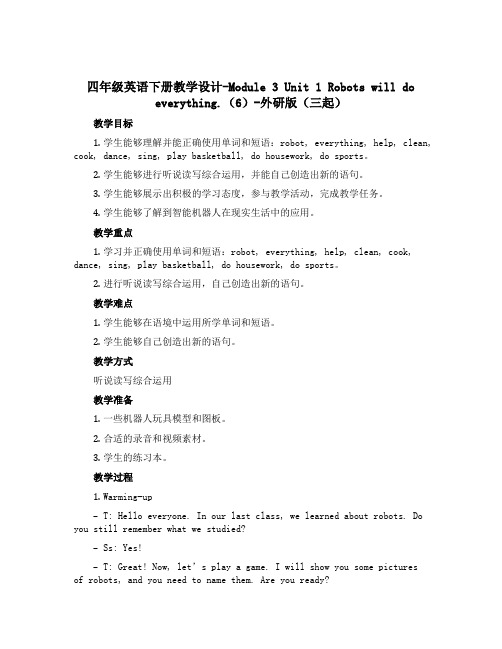
四年级英语下册教学设计-Module 3 Unit 1 Robots will doeverything.(6)-外研版(三起)教学目标1.学生能够理解并能正确使用单词和短语:robot, everything, help, clean, cook, dance, sing, play basketball, do housework, do sports。
2.学生能够进行听说读写综合运用,并能自己创造出新的语句。
3.学生能够展示出积极的学习态度,参与教学活动,完成教学任务。
4.学生能够了解到智能机器人在现实生活中的应用。
教学重点1.学习并正确使用单词和短语:robot, everything, help, clean, cook, dance, sing, play basketball, do housework, do sports。
2.进行听说读写综合运用,自己创造出新的语句。
教学难点1.学生能够在语境中运用所学单词和短语。
2.学生能够自己创造出新的语句。
教学方式听说读写综合运用教学准备1.一些机器人玩具模型和图板。
2.合适的录音和视频素材。
3.学生的练习本。
教学过程1.Warming-up–T: Hello everyone. In our last class, we learned about robots. Do you still remember what we studied?–Ss: Yes!–T: Great! Now, let’s play a game. I will show you some picturesof robots, and you need to name them. Are you ready?–Ss: Yes!2.Pre-task–T: Ok, now let’s talk about robots again. Do you think robots are important? Can they help us? What can they do? Please discuss with your classmates first.–Ss: …–T: Alright, now let’s watch a short video to see how robots help people. Please pay attention, we will have a quiz afterwards.3.While-task–T: Now, let’s move on to our new lesson. In this unit, we will learn how robots will do everything and what they can do. First, let’s learn some new words. Please follow me to read the words after me: robot, everything, help, clean, cook, dance, sing, play basketball, do housework, do sports. Now, let’s use these words to make sentences. Please work in pairs and write down at least three sentences.4.Post-task–T: Great job, everyone! Now, let’s check the sentences you made. Who wants to share the sentences they wrote with us?–Ss:–T: Good job! Can anyone else share more sentences with us?–Ss:–T: Excellent! We all did a great job. Now, let’s do some writing practice. Please write down the sentences you just shared in your exercise books.5.Extension–T: For the homework, please watch the video again and write downat least three things you learned from it. Don’t forget to use the words we learned today in your writing.教学评价•通过展示、游戏、小组合作等活动方式激发学生的学习兴趣。
新外研版英语四年级下册Module 3 Unit 1教案

Module 3 RobotsUnit 1 Robots will do everything一、教材分析本单元是以Robots为题的对话,要求学生在第三模块的基础上会用Will they do the housework? Will they do the homework? 以及回答Yes, they will. No, they won’t.来谈论将来可能发生的事。
第三模块已经学习了Will you take …to …? Yes, I will. No, I won’t.本模块学习起来相对简单一些,但学生必须通过大量的操练才能熟练的掌握。
二.教学目标:知识目标:1.基本能够听懂,会说,会读词汇:robot, one day, everything, housework, learn, our.2. 学会用“Will they…? Yes, they will./ No, they won’t.”以及“I can walk / talk.”的语言结构。
能力目标:能够听懂会说本模块句型,能灵活运用功能句谈论将来的行为,培养学生的想象能力。
情感目标:在积极参与教学活动及小组合作中激发学生兴趣,体会到学习的快乐。
教学重、难点:灵活运用Will they…? 以及回答Yes, they will. No, they won’t.来谈论将来发生的事情。
三、学情分析本模块内容设计适合四年级学生,他们经过一年的学习初步具备一定的听说读的技能,有一定的模仿能力,在老师的引导下,能运用所学基本句型进行语言操练,在课堂教学中能积极参与,互动交流。
并且一般将来时态will在第三模块已经学习接触过,学习起来难度会降低一些。
本课主要运用will 对将来要做的事情进行提问,对于大多数学生来说比较容易掌握。
但是,要灵活自如地运用重点句型进行语言交流,还需要大量的操练。
四.教学方法:五步教学法,小组合作学习五、教学策略1、注意策略通过比赛、竞争、观看视频等各种灵活多样的方法,利用学生注意的选择性和转移性,把学生的注意力牢牢地吸引在课堂上,增强学生注意的稳定性。
外研版四年级下册英语Module3-Unit1-Robots-will-do-everything课件
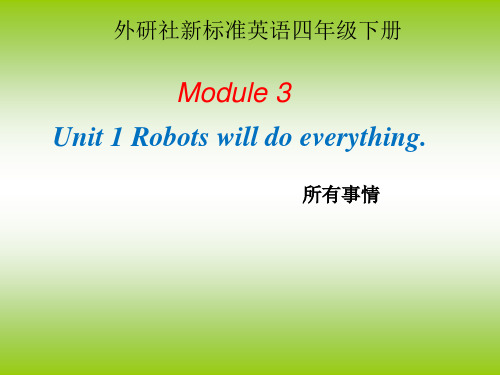
4
Robots will do the housework.
5
Robots will take pictures.
Won’t =will not 将不会
Will robots eat apples/ drink milk? 机器人将会吃苹果/喝牛奶吗? ----No, they won’t.
不,它们将不会。
观看Video, 并回答问题。
1)Daming’s robots can walk. ( T) T( ) 2)2) It can talk.
T ) 3)3) Robots will help children learn.(
F ) 4)4) They will do homework.(
It’s a robot.
机器人
Robots
Robots can talk. Robots can walk.
能
说话
走路
Robots can sing. 唱歌
Robots can play football.
one day (将来)有一天 will 将,将会
everything 所有事情
One day, robots will do everything (将来)有一天, 机器人将会做所 有事情。
Sing a song 唱
They will sing a song.
歌
take pictures 照相
They will take pictures.
以“Robots will…”开头说句子。
3
1
2
Robots will make a cake.
Robots will sing a song. Robots will help children learn.
四年级英语下册Module3Unit1Robotswilldoeverything教案4外研版(三起)
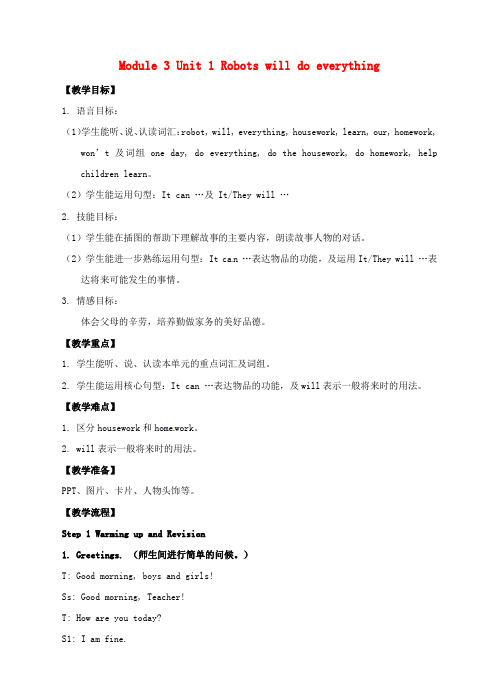
Module 3 Unit 1 Robots will do everything【教学目标】1. 语言目标:(1)学生能听、说、认读词汇:robot, will, everything, housework, learn, our, homework, won’t及词组one day, do everything, do the housework, do homework, help children learn。
(2)学生能运用句型:It can …及 It/They will …2. 技能目标:(1)学生能在插图的帮助下理解故事的主要内容,朗读故事人物的对话。
(2)学生能进一步熟练运用句型:It ca n …表达物品的功能,及运用It/They will …表达将来可能发生的事情。
3. 情感目标:体会父母的辛劳,培养勤做家务的美好品德。
【教学重点】1. 学生能听、说、认读本单元的重点词汇及词组。
2. 学生能运用核心句型:It can …表达物品的功能,及will表示一般将来时的用法。
【教学难点】1. 区分housework和home work。
2. will表示一般将来时的用法。
【教学准备】PPT、图片、卡片、人物头饰等。
【教学流程】Step 1 Warming up and Revision1. Greetings. (师生间进行简单的问候。
)T: Good morning, boys and girls!Ss: Good morning, Teacher!T: How are you today?S1: I am fine.用同样的方式问候几个学生。
2. Say a chant:教师利用PPT帮助学生复习已学习过的一些动词:Run, run, I can run.Jump, jump, I can jump.Swim, swim, I can swim.Sing, sing, I can sing.Talk, talk, I can talk.Read, read, I can read.Step 2 Presentation and Practice一、Listen and chant.1. 教师出示该部分图片,提问Q1: What can you see in the picture?学生看图回答:I can see ...2. 教师让学生描述图中人物会做的事情:Amy can fly a kite.Sam can ride a bike.3. 教师播放歌谣动画,让学生整体感知歌谣,并确定自己的描述正确与否。
四年级下册英语教案 Module3 Unit1 He shouted, “wolf, wolf!”外
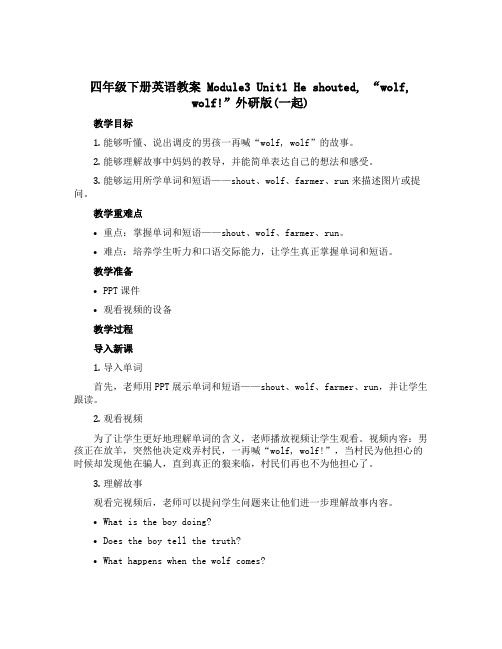
四年级下册英语教案Module3 Unit1 He shouted, “wolf,wolf!”外研版(一起)教学目标1.能够听懂、说出调皮的男孩一再喊“wolf, wolf”的故事。
2.能够理解故事中妈妈的教导,并能简单表达自己的想法和感受。
3.能够运用所学单词和短语——shout、wolf、farmer、run来描述图片或提问。
教学重难点•重点:掌握单词和短语——shout、wolf、farmer、run。
•难点:培养学生听力和口语交际能力,让学生真正掌握单词和短语。
教学准备•PPT课件•观看视频的设备教学过程导入新课1.导入单词首先,老师用PPT展示单词和短语——shout、wolf、farmer、run,并让学生跟读。
2.观看视频为了让学生更好地理解单词的含义,老师播放视频让学生观看。
视频内容:男孩正在放羊,突然他决定戏弄村民,一再喊“wolf, wolf!”,当村民为他担心的时候却发现他在骗人,直到真正的狼来临,村民们再也不为他担心了。
3.理解故事观看完视频后,老师可以提问学生问题来让他们进一步理解故事内容。
•What is the boy doing?•Does the boy tell the truth?•What happens when the wolf comes?拓展课程1.反复练习在学生清楚了单词含义和故事内容后,老师运用PPT进行练习。
•PPT上呈现图片,学生用所学单词和短语进行描述;•老师提问,让学生以所学单词和短语回答问题。
2.模拟对话老师出示课文中的句子,并让学生以真实情境模拟对话,让学生更深入理解课文内容和使用英语对话。
•Boy: Wolf, wolf!•Some villagers: What? Where is the wolf?3.让学生运用所学内容写一篇短文学生可以根据老师所提供的问题和提示,运用所学单词和短语,写一篇关于“wolf, wolf”的短文。
四年级英语下册Module3Unit1Heshouted“Wolfwolf教案2外研版(一起)

课题
Module 3 Unit 1
He shouted,“Wolf, wolf!”
课型
新授
课时
1课时
教学
三维
目标
知识目标:学会本课的12个单词。
能力目标:能熟练的读课文,能将对话进行排顺序。
情感文版的《狼来了》可以在同学们熟悉的中文版故事《狼来了》的基础之上,文章十分有趣,但一般过去式的结构应该是学生学习的难点。
sheep,bored,village,shout,wolf,
Everyone ,field,laugh,lie
教学
反思
这篇课文是本学期的一篇重点课文,在教材辅导的时候,王老师特别讲到了这一课,如果出题很有可能是按课文内容排列顺序。所以我在课前特别认真的备了课,找出了重点句型过去式,并带领同学们一起找出了课文中的动词过去式并整理了规则变化和不规则变化。布置了同学们进行背诵课文。同学们的学习状态很好。
7、完成活动3。老师请学生先两人一组一起观察这四幅图,根据所给的四个关键词找出故事发展的。然后请学生小声自己尝试用英文讲述这个故事,老师可在班里巡视,及时帮助学生。最后,老师请几位学生给大家讲述这个故事,如果有困难,可先后请四位学生每人讲一部分。
8、把表述课文内容的句子打乱,再结合图片,让同学们排顺序。
5、老师再次播放录音,之后请学生尝试复述课文,学生复述时,老师依次适时出示:“once upon a time,look after,sheep,bored,village,shout,wolf,
Everyone ,field,laugh,lie”的单词卡片。
6、完成活动2。初步讲解一般过去时的构成。
三、课文教学:
外研版小学英语四年级下册Module 3 unit 1Robots will do everything

robot
one day
(将来)有一天 won't=will not 将不会 • homework 家庭作业
part1
Sam can ride a bike. He can ride his bike. Amy can fly a kite. She can fly her kite.
her 她的 his 他的
如何描述某人将要做某事
• 课文应用:One day , robots will do
everything.(将来有一天,机器人将会做所有 事情。)
• 句型结构:主语+will+动词原形+其他。 • 重点解析:will表示“将,将会”,帮助构成
一般将来时,后面接动词原形。
练习
1.我将要去游泳。I will go swimming.
主语
形容词性物主代词
I
my 我的
you
your 你的
he
his 他的
she
her她的
it
its 它的
we
our 我们的
主语
形容
• Sam: What's that,Daming ? 那是什么,大明? • Daming: It's a robot. 它是一个机器人。 • Sam: Wow ! It can walk ! 哇!它会走。 • Daming : Yes, it can. 是的,它会。 • Daming : And it can talk ! 它还会说话。 • Robot : Hello ! • Sam : Wow ! • Daming : One day, robots will do
并且它们将会帮助孩子们学习。
- 1、下载文档前请自行甄别文档内容的完整性,平台不提供额外的编辑、内容补充、找答案等附加服务。
- 2、"仅部分预览"的文档,不可在线预览部分如存在完整性等问题,可反馈申请退款(可完整预览的文档不适用该条件!)。
- 3、如文档侵犯您的权益,请联系客服反馈,我们会尽快为您处理(人工客服工作时间:9:00-18:30)。
London bridge is falling down.
• • • • • • • • London bridge is falling down, falling down, falling down. London bridge is falling down, my fair lady! London bridge is falling down, falling down, falling down. London bridge is falling down, my fair lady!
• What are they going to do on Saturday
•They are going to have a picnic.
•Will Amy take her kite tomorrow?
No, she won’t.
Will Amy take her ball tomorrow? No, she won’t.
Why? Because… So
I’m going to take … I’ll take …
have a picnic
•
ball
great
why
because
take
ቤተ መጻሕፍቲ ባይዱ
On Saturday We’re going to have a picnic.
Great.
Will you take your kite tomorrow.
Let’s review the key points
• We’re going to … .
• Will you …? Yes,I will. No, I won’t.
What will you take?
5 things?
Sports Day is coming , What will you take ?
I’m going to go on Friday and Saturday. Friday 星期五 Saturday星期六
I’m going to have a picnic. 野餐 假如你去旅游,你将带什么去? Will you take …? Yes ,I will. No, I won’t
Will you take a present for your friends? Will you take ……?
Homework
Try to remember the new words
Prepare a dialogue use the sentences.
No,I won’t.
Oh! will you take your ball tomorrow.
No I won’t
Why not?
Because tomorrow is Friday.
Oh,we’re going to have a picnic on Saturday.
Yes. So I will take my kite and my ball on Saturday.
